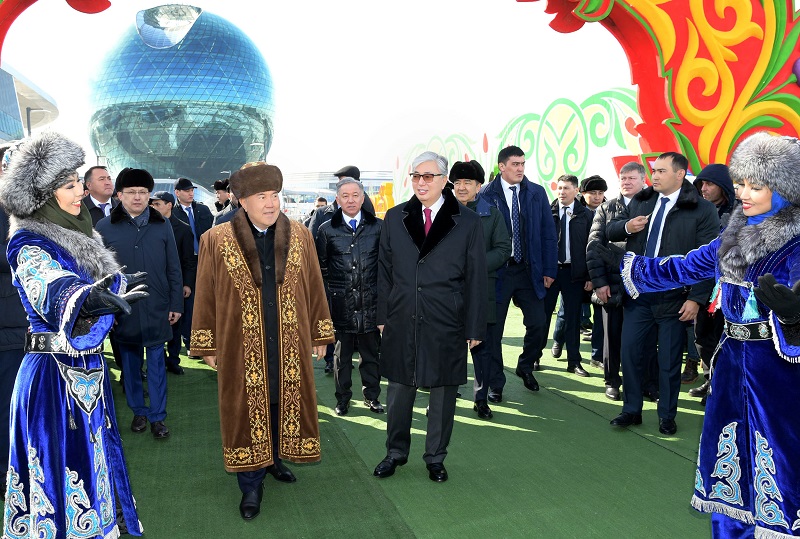
On 19 March, the only president that independent Kazakhstan has ever known, Nursultan Nazarbayev, announced his resignation after almost three decades of near-absolute power. In a televised speech, Nazarbayev praised the country’s achievements and called on its youth to build a bright future.
Yet it was not a full farewell, because Nazarbayev said that he’s not leaving the political scene. The big question now is what comes next for Kazakhstan.
Although Nazarbayev’s resignation came as a surprise, his promise to remain in politics was years in the making. He previously received the titles of First President (2000), Leader of the Nation (2010), and, in 2017,
Elbasy, a Kazakh word meaning head of the nation or people. Because of his ‘historic mission’, he was given the lifelong right to present initiatives on state-building, domestic and foreign policy, and national security. What’s more, Kazakh state bodies are obliged to consider his proposals.
The ‘First President’ also heads the Assembly of the People of the Republic of Kazakhstan and the Security Council (which was elevated from an advisory to a constitutional body in 2018), and is a member of the Constitutional Council. Nazarbayev, his family and their property and bank accounts have also been given full immunity from prosecution. In addition, he is chairman of the ruling Nur Otan party.
This exit without leaving resembles the semi-departure of Singapore’s founding father Lee Kuan Yew, and is very different from the resignation and full political retirement in 1999 of Boris Yeltsin, independent Russia’s first president. Singapore has always been a major inspiration for Nazarbayev, who held Lee in the highest regard. Effective and highly respected at home and abroad, Lee tops the short list of leaders who made authoritarianism look good.
Nazarbayev would like to follow Lee in becoming an elder statesman, thereby avoiding the less pleasant fate of other authoritarian rulers. He is certainly well aware of the fragility of power. He became Kazakhstan’s leader amid the tumultuous collapse of the Soviet Union, and has witnessed the downfall of authoritarian peers around the world.
Resigning, and having to trust new Kazakh leaders, must therefore have been a difficult decision. Nazarbayev’s record in office, marred by corruption scandals, is more controversial than Lee’s, and he felt betrayed by his own family when his son-in-law attempted a coup d’état over a decade ago.
In addition to his personal security, Nazarbayev is eager to ensure his legacy as a statesman and founding father. Balancing those two goals will not be easy. He could best guarantee his security by maintaining the status quo and continuing to exercise tight political and economic control. Burnishing his legacy, on the other hand, will require reforms that boost further development and prosperity. Adding to the challenge are a build-up of domestic problems and a more dangerous and unpredictable international environment.
The careful preparations for Nazarbayev’s post-presidency suggest that his resignation is most likely part of a long-term strategy. As the Kazakh constitution stipulates, the speaker of the Senate, Kassym-Jomart Tokayev, a Nazarbayev loyalist, was appointed president until the end of the current presidential term in 2020. His daughter, Dariga Nazarbayeva, was elected to be the new speaker of the Senate.
Although there are few clues as to what will happen next, speculation tends to focus on three issues: political power relations, social discontent and Nazarbayev’s personality cult.
Nazarbayev has built a political system that combines Singaporean-style technocratic governance with feudal loyalty. True, Kazakhstan has made some progress in fostering a professional state. But, unlike Lee, Nazarbayev has not built strong institutions, such as a competitive political party system, or an independent judiciary. This will make the political transition particularly difficult, because institutions will need to be built along the way.
Some decentralisation of power seems inevitable. If the current highly presidential system remains intact, Nazarbayev and his successor will probably maintain a duopoly. But if the new president cannot consolidate power sufficiently—a distinct possibility—then multiple power brokers will emerge, with no strong parties to help channel their differences. In this scenario, even Nazarbayev might not be able to keep the resulting conflicts under control.
In this context, recent and ongoing protests could be precursors of more serious upheavals later. Although there are currently no clear demands for democracy, there is growing dissatisfaction with social injustices. And, ad hoc measures aside, Kazakhstan currently has no mechanism for channelling and addressing popular grievances.
Finally, unlike Lee, Nazarbayev ended up encouraging his own personality cult. Public officials and ordinary citizens alike praise the president’s genius, wisdom, devotion and other qualities. There are monuments to him throughout the country. The most advanced university and schools, the central avenue in Almaty, and the airport in the capital, Astana, had all borne his name prior to his resignation.
The cult is getting stronger. On 20 March, Kazakhstan’s parliament voted to rename the capital Nursultan and many cities renamed their central streets after Nazarbayev. This is raising concerns among some sectors of the population—a response that the government shouldn’t ignore.
The cult will most probably soften with time. But it’s unlikely to disappear, because it would be impossible (and unfair) to decouple Nazarbayev from Kazakhstan’s independence narrative. This is why Nazarbayev’s resignation marks a critical juncture for Kazakhstan. He came to power at a time of profound and unexpected change, and his semi-departure could have equally unpredictable consequences.
 Print This Post
Print This Post